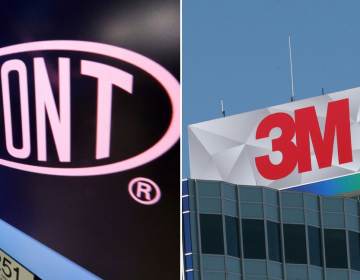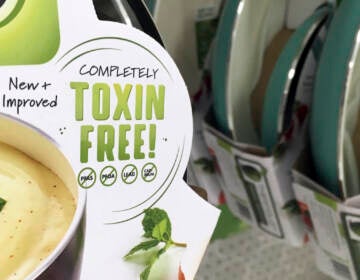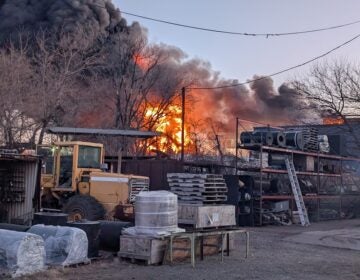Spurred by regulators, 3M to phase out ‘forever chemicals’
The announcement Tuesday comes after U.S. environmental regulators in August designated the chemicals as hazardous substances under the so-called Superfund law.

File photo: The logo for chemical and consumer products maker 3M appears on a screen above the trading floor of the New York Stock Exchange on Oct. 24, 2017. The company said Tuesday, Dec. 20, 2022, that it will phase out manufacturing of “forever chemicals” and try to get them out of all their products by the end of 2025. (AP Photo/Richard Drew, File)
3M will phase out the manufacturing of so-called “forever chemicals” and try to get them out of all their products within two years, the chemical and consumer products maker said Tuesday.
The decision announced Tuesday arrives after U.S. environmental regulators designated the chemicals — used in nonstick frying pans, water-repellent sports gear, stain-resistant rugs, cosmetics and countless other consumer products since the 1940s – as hazardous substances under the Superfund law.
While the designation is not an outright ban, polyfluoroalkyl substances, better known as PFAS, require a report to federal, state or tribal officials if the amount released into soil or water meet or exceed a certain level. The Environmental Protection Agency could then require cleanups to protect public health and recover cleanup costs.
PFAS have been voluntarily phased out by U.S. manufacturers but are still in limited use and remain in the environment because they do not degrade over time.
3M said its decision was based on multiple factors, including “accelerating regulatory trends focused on reducing or eliminating the presence” of the chemicals in the environment.
The chemicals can accumulate and persist in the human body for long periods of time, and evidence from animal and human studies indicates that exposure to PFAS may lead to cancer or other health problems, including damage to organs including the liver, kidneys and thyroid gland.
3M, based in Saint Paul, Minnesota, said it will exit all PFAS manufacturing and “work to discontinue use of PFAS” in all its products by the end of 2025.
3M makes a broad range of consumer products, including Post-it notes, Scotch Brite cleaning supplies, adhesives and personal protective equipment.
Chemical and other industrial companies have been sued frequently in recent years for downplaying the dangers of the chemicals.
In a November lawsuit, the state of California accused 3M, Dupont and 16 smaller companies of covering up the harm caused to the environment and the public from chemicals manufactured by the firms that have over decades found their way into waterways and human bloodstreams.
Last year, the Biden administration launched a broad strategy to regulate the toxic industrial compounds that the EPA said are increasingly turning up in public drinking water systems, private wells and even food.
The Defense Department, Food and Drug Administration and Agriculture Department were all tapped to join the effort intended to restrict PFAS from being released into the environment and accelerate cleanup.
WHYY is your source for fact-based, in-depth journalism and information. As a nonprofit organization, we rely on financial support from readers like you. Please give today.






